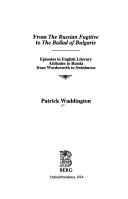Anglo-Russian Affinities
1 total work
v. 3
From the "Russian Fugitive" to the "Ballad of Bulgarie"
by Patrick Waddington
Published 1 April 1994
In September 1849, at Rydal Mount near Grasmere, a ginger-headed Eton schoolboy talked of poetry with England's laureate. The one was born in 1770; the other died in 1909. The entire 19th century, and more, is spanned by the careers of Wordsworth and Swinburne. During this time Britain came to be Europe's leading power, but only at the cost of increased insularity and imperialism. Rival nations were not easily tolerated. The Russian empire in particular was achieving a different but parallel rise to that of Britain and in some respects had already outstripped it in the later stages of the period. An increasing interest in, involvement with, and detestation and fear of Russia was apparent among the British and found echoes in English literature. The many novels of the time hinted at this; but it was the great poets who actually took Russian or related subjects and best reflected national moods. In their different ways, Tennyson, Robert Browning and the Rossettis showed curiosity, anger and contempt in relation to Imperial Russian motives and ambitions and the related poems of each are discussed in this volume.
From the unpolitical curiosity of Wordsworth in his "Russian Fugitive" to Swinburne's blatant anti-Russian stand in "The Ballad of Bulgarie" lies a graduated development which matches changing policy and attitudes in Britain.
From the unpolitical curiosity of Wordsworth in his "Russian Fugitive" to Swinburne's blatant anti-Russian stand in "The Ballad of Bulgarie" lies a graduated development which matches changing policy and attitudes in Britain.
